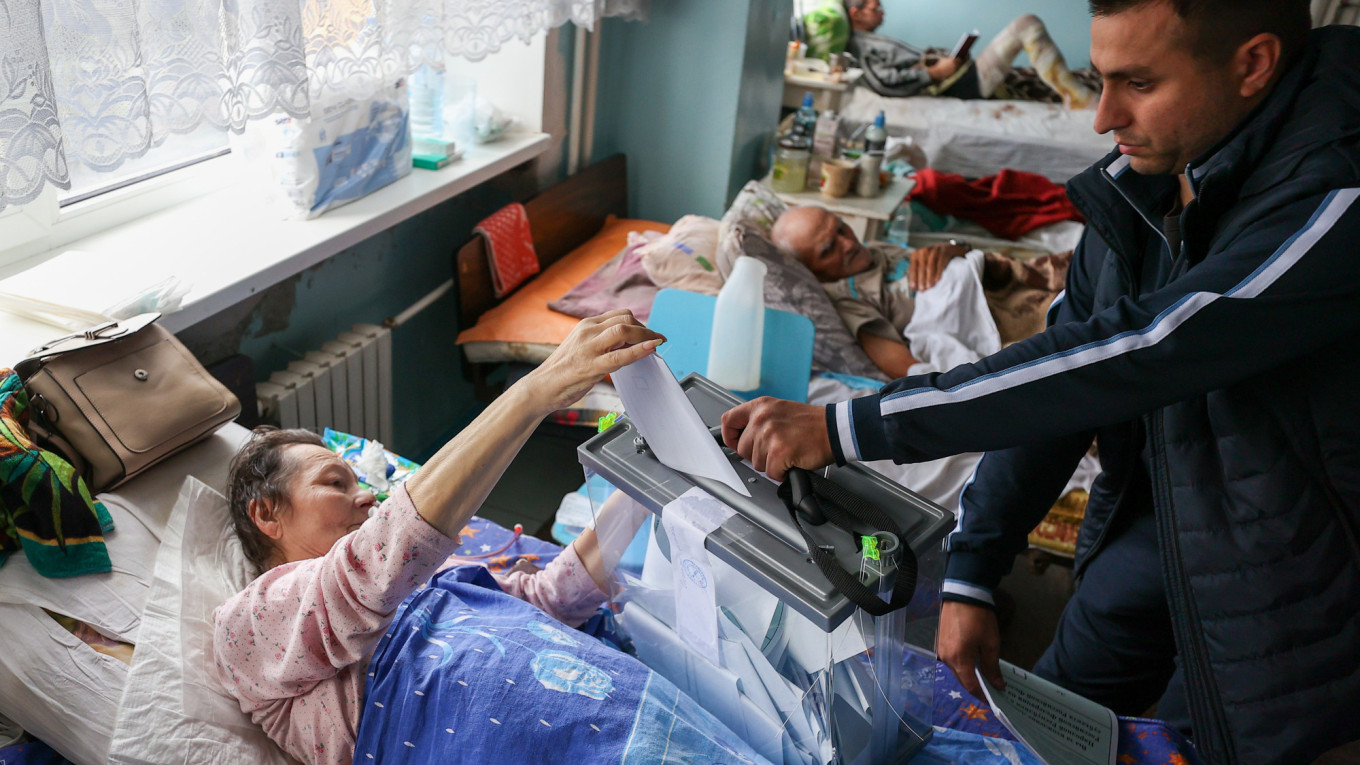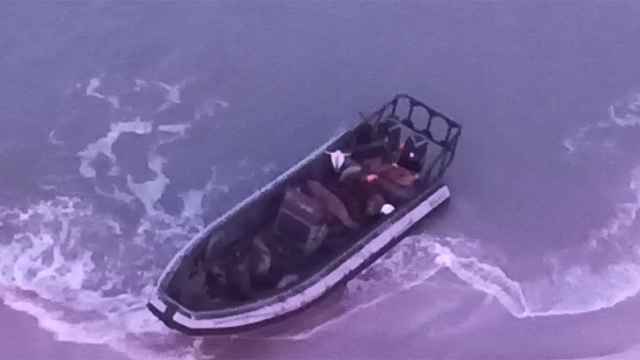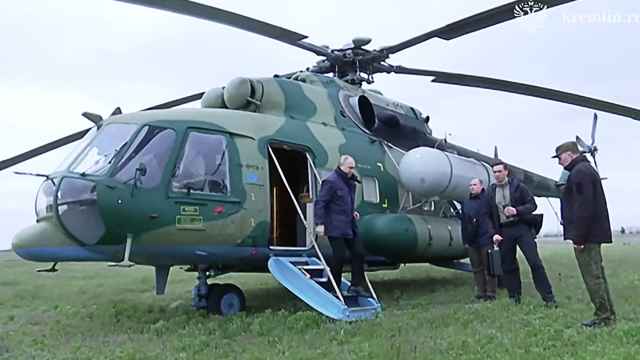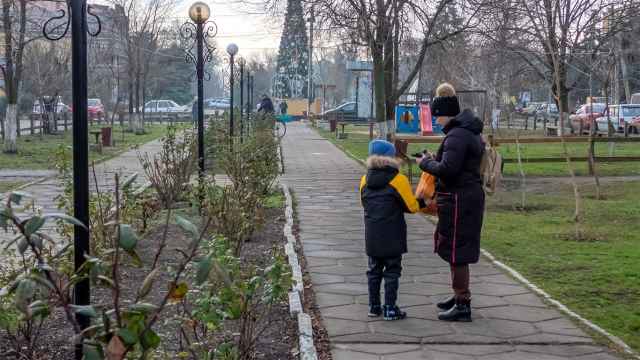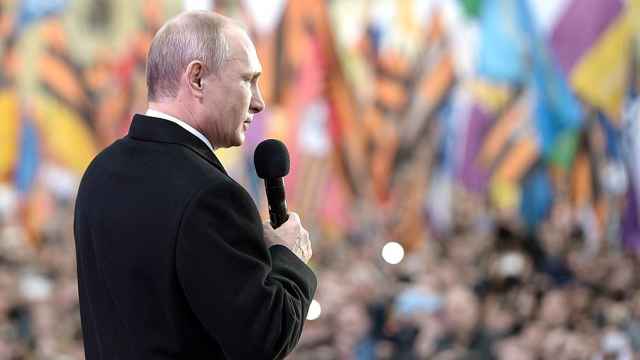Annexation polls were due to close Tuesday in Kremlin-controlled regions of Ukraine, as officials in Moscow repeated warnings that Russia could use nuclear weapons to defend the territories from Ukrainian counter-attacks.
Kyiv and its allies have denounced the votes as a sham and said the West would never recognize the results of the ballots that have dramatically ratcheted up the stakes of Russia's seven-month invasion.
Kremlin-installed officials in the four regions have said the outcome could be announced as early as Tuesday evening or Wednesday.
"Saving people in the territories where this referendum is taking place... is the focus of the attention of our entire society and of the entire country," Vladimir Putin said during a televised meeting with officials.
His spokesman Dmitry Peskov said the votes would have "radical" legal implications and that the so-called referendums "will also have consequences for security," referring again to Moscow's threats to use nuclear weapons to defend its territory.
Russian forces in Ukraine this month have suffered serious setbacks, both in the east and south of the country, which observers say pushed Putin to rush ahead with the vote to cement Moscow's authority there.
Putin said Russia would use any and all available means to defend its territory, implying that after the four regions were annexed Moscow could deploy strategic nuclear weapons to repulse Ukrainian attempts to take back the territory.
Nuclear 'right'
"I want to remind you — the deaf who hear only themselves: Russia has the right to use nuclear weapons if necessary," former leader Dmitry Medvedev warned Tuesday on social media.
The four Russian-occupied regions of Ukraine — Donetsk and Lugansk in the east and Kherson and Zaporizhzhia in the south — announced that they would hold the elections just days before voting began last Friday.
Together, they form a crucial land connection for the Kremlin between Russia and the Crimean peninsula, which Moscow annexed in 2014 and is otherwise only connected to the mainland by bridge.
The EU spokesman Peter Stano announced the bloc will slap sanctions on organizers of the "illegal" vote, following a similar move by the U.K. earlier in the week.
French Foreign Minister Catherine Colonna meanwhile was in Kyiv for a surprise visit to meet with President Volodymyr Zelensky and underscore her country's support for Ukraine's "sovereignty and territorial integrity."
Even Moscow's closest ally since the start of the invasion, Beijing, said after the votes were announced last week that Russia should respect territorial integrity in the war.
Counter-offensive
The so-called referendums follow a pattern that Moscow utilized in Crimea after nationwide street demonstrations saw Ukraine's Kremlin-friendly president ousted.
Like then, the outcome of the ballot is being viewed by observers as a foregone conclusion. Election officials brought ballot boxes door-to-door in many cases accompanied by armed Russian forces.
Lawmakers are expected to vote hastily to annex the territories after the results are announced and Russian news agencies have said Putin could sign legislation formalizing the land grab this week.
Ukrainian forces meanwhile have pursued their counter-offensive in the east and the governor of the eastern Kharkiv region announced Tuesday its forces had recaptured Kupiansk-Vuzlovyi "one of the largest logistical and railway junctions" in the region, not privy to this week's vote.
With fighting continuing along the sprawling frontline, AFP journalists were led to the country's latest suspected mass burial site in a shell-damaged and abandoned industrial chicken farm.
"I was told by the soldiers who came to our village that they saw a burial place of soldiers, but they didn't specify the number," said Lyudmyla Vakulenko, head of the Kozacha Lopan local administration.
The village is in the eastern Kharkiv region where a counter-offensive by Ukrainian troops saw dozens of towns and villages recaptured.
Along with threats to use nuclear weapons, Putin announced a mobilization of hundreds of thousands of Russian men to bolster Moscow's army in Ukraine, sparking demonstrations and an exodus of men abroad.
The UN voiced alarm on Tuesday at credible reports of nearly 2,400 arrests in less than a week during nationwide protests in dozens of cities against the draft order.
Ex-Soviet Georgia, which was invaded by Russia in 2008, said the numbers of Russians crossing its borders had increased to around 10,000 people daily since Putin's announcement.
Kazakhstan, the Central Asian country on Russia's southern border meanwhile said nearly 100,000 people had entered the country since Sept. 21 and its leader Kassym-Jomart Tokayev said authorities would "ensure their safety."
A Message from The Moscow Times:
Dear readers,
We are facing unprecedented challenges. Russia's Prosecutor General's Office has designated The Moscow Times as an "undesirable" organization, criminalizing our work and putting our staff at risk of prosecution. This follows our earlier unjust labeling as a "foreign agent."
These actions are direct attempts to silence independent journalism in Russia. The authorities claim our work "discredits the decisions of the Russian leadership." We see things differently: we strive to provide accurate, unbiased reporting on Russia.
We, the journalists of The Moscow Times, refuse to be silenced. But to continue our work, we need your help.
Your support, no matter how small, makes a world of difference. If you can, please support us monthly starting from just $2. It's quick to set up, and every contribution makes a significant impact.
By supporting The Moscow Times, you're defending open, independent journalism in the face of repression. Thank you for standing with us.
Remind me later.


